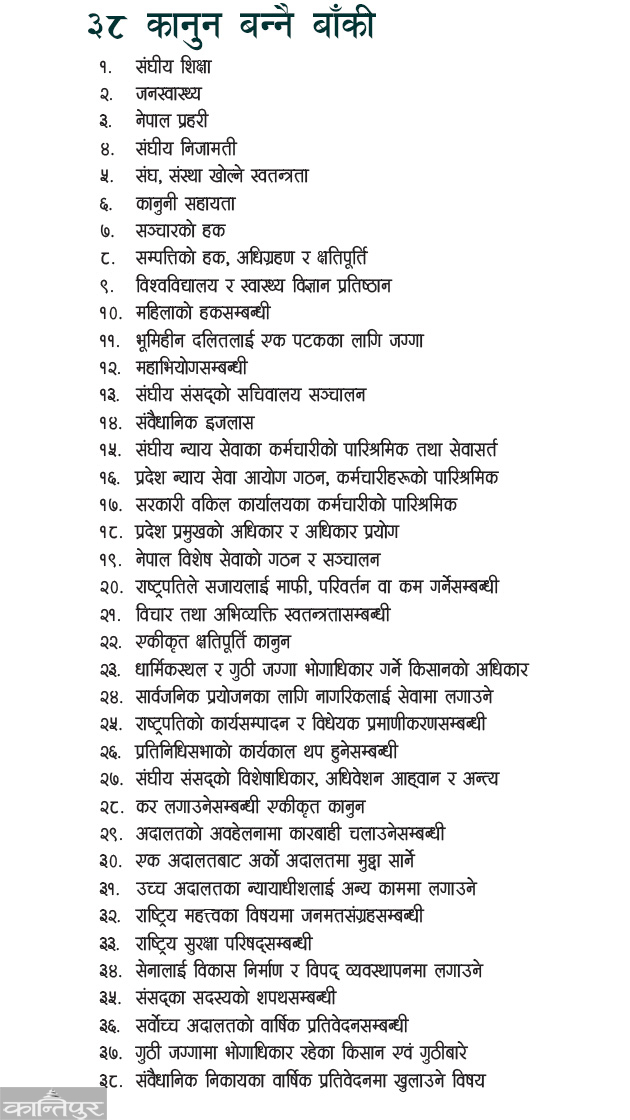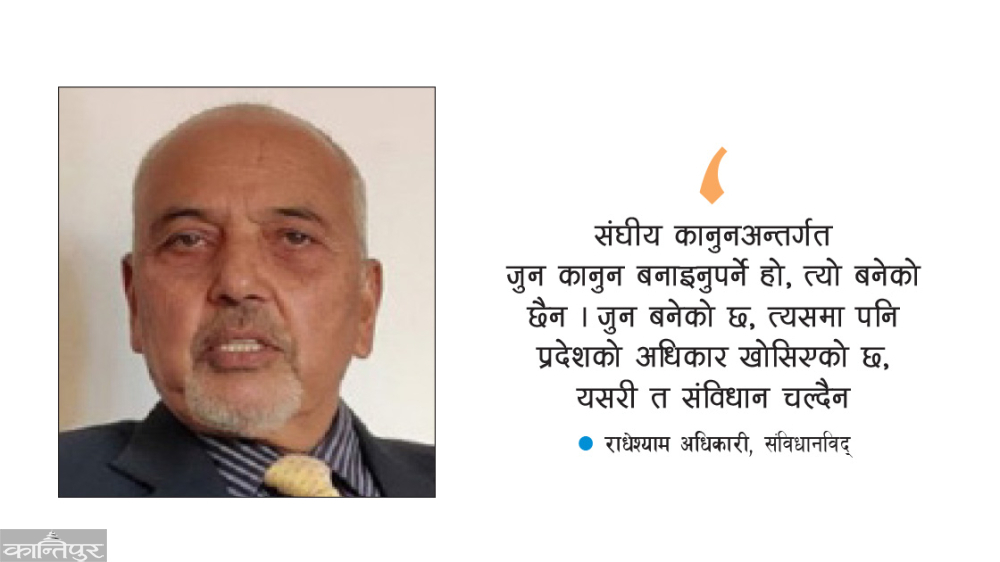9 years of the Constitution: The question is more about governance than about the constitution

We use Google Cloud Translation Services. Google requires we provide the following disclaimer relating to use of this service:
This service may contain translations powered by Google. Google disclaims all warranties related to the translations, expressed or implied, including any warranties of accuracy, reliability, and any implied warranties of merchantability, fitness for a particular purpose, and noninfringement.

Highlights
- Due to the absence of laws which are essential for the implementation of federalism by the federal parliament, the state governments could not use the rights given by the constitution



Within 9 years of the promulgation of the constitution, two major political parties have put forward the amendment agenda for good governance and political stability. As the necessary laws for the implementation of the constitution and federalism could not be made, major political parties have moved towards amending the constitution. About 38 important laws are yet to be made for the implementation of the constitution and federalism.

The Legislation Committee of the National Assembly has prepared a list of laws to be made for the implementation of federalism and passed it in the Parliament. The "Study Report of the Laws yet to be made in accordance with the Constitution" was passed by the Legislation Management Committee in May 2080. In order to implement the constitutional provisions, at least 181 laws should be formulated, it seems that the union should make 151 laws, the state should make 24 and the local level should make 6 laws. Out of 151 Union Jurisdiction Acts, 40 are yet to be promulgated,” said the study report. After the publication of this report, 2 laws have been made. According to the study of the
committee, for the implementation of the constitution, the Federal Civil Act, the Federal Education Act, the Public Health Act, the law related to the integrated justice system (in order to clarify the need, purpose and rationale of the Provincial Justice Service Commission), the reform of the Nepal Police Law, the integrated law related to the right to communication, property A unified law on rights, acquisition and compensation, a law on women's rights, a constitutional bench, a law on the powers and exercise of powers of the provincial head, and a law on ending tax duplication are yet to be made.

In the previous parliament, a small number of laws were made for the implementation of the constitution and some of the laws that were made have not been implemented. A prime example of this is the Nepal Police and State Police (Operation, Supervision and Coordination) Act. The constitution has given the province the sole right to maintain internal peace and security in its territory. However, three years after the law came into force, the provincial police has not been formed due to non-implementation. The union government seems to be apathetic in adjusting the police force. Although it was announced that the adjustment has been completed with the introduction of the Staff Adjustment Act, the provinces have not yet received the staff according to the prescribed posts. The Federal Civil Service Act has not come. Due to the absence of the said Act, according to the new constitution, there is no management of employees at three levels.
During the previous tenure of the House of Representatives, 121 laws were passed for the implementation of the constitution and federalism. However, in the 21 months after the second general election, the Federal Parliament has passed only 17 bills, including two related to the annual budget. Among them are 6 regular bills related to the budget of two financial years. Sonam Geljen Sherpa, Chairman of National Affairs Committee of the National Assembly, says that about 80 federal laws and more than 100 existing laws need to be amended to strengthen federalism.
The state government is constantly increasing pressure on the government to create federal laws to implement federalism. Due to the delay in the formulation of federal laws, the provinces have not been able to operate properly. MP Sherpa said that the government could not give enough 'business' to the parliament in terms of law making. Mukund Sharma, the former secretary of the Parliament Secretariat, says that until the end of the post-election period and the completion of the four Parliament sessions, it cannot be considered that the law-making work has been done satisfactorily.
Law-making did not seem to be speeding up. On the one hand, the government has not been able to bring many bills to the parliament,' he said, 'on the other hand, the committees have not been able to work quickly and give results even in the bills registered in the parliament.'
In the period of 21 months, many laws have been created in terms of numbers, he said. The bill on civil servants has become an example of not being able to reach an agreement despite the discussion on some bills in the parliamentary committee lasting for months. Similarly, the School Education Bill is also an important bill related to the implementation of federalism. It is not known when the bill, which was registered in the House of Representatives a year ago, will be passed. Former Secretary of the Parliament Sharma comments that the Parliament is busy elsewhere than where it should be focused. "As a result of that, the Parliament is not able to give even the minimum achievement in the field of law making," he said, "Parliament gets entangled in what is needed/not needed." If a word is parliamentary or non-parliamentary, the functioning of the parliament will be stopped and how will the result come?'
The constitution has divided the government structure into three levels and the right to exercise state power has been given to all three levels. The constitution has clearly divided the powers for the central, state and local level structures and has made a clear provision that laws should be made to implement them. However, despite the completion of 9 years of the constitution, the provincial and local levels have not been able to use it. The reason for that is the lack of legislation by the central government and the federal parliament. Due to the fact that the laws that are essential for the implementation of federalism are not made by the federal parliament, the provincial governments have not been able to use the delegated powers from the constitution.
After the promulgation of the constitution, two years have passed since the completion of the five-year first term of the House of Representatives and the beginning of the second term. After the House of Representatives elections of 2074, the creation of laws was not a priority even though there was a two-thirds majority government of the UML and the Maoist Center. Now there is a ruling coalition of Congress-UML which has the support of almost two-thirds, but now the constitution amendment agenda has been shifted to the front rather than making the necessary laws for the implementation of the constitution.
'Federalism is not being fully tested'

It has been 9 years since the constitution was issued, how do you evaluate and review the constitution based on its implementation during this period?
Based on the expectation of bringing this constitution, mixed results are seen. Good progress has been made in several areas. Take proportional inclusion for example. This is the essence of the constitution. Due to the proportional inclusion system, 33 percent women are represented in the parliament. Representation of women at the local level is 40 percent. In this regard, we are in the leading position in South Asia.
The representation of Dalits in the back is coming up. The presence of backward Madhesi, tribes and others has increased in the society. This is a strong point of the constitution, a matter to be proud of. If you look at the union, state and local level, I like the work of the local level. The republic has also become stronger. Dharai feels that the monarchy will return or not. Constituent Assembly, union, state and local level elections have been held. What has been seen in all the elections is that there are no votes in favor of those who want a king. It can be clearly seen that the people are in favor of the republic. For that reason, the country is oriented towards stability.
On the other hand, the federal government and parliament are failing to fully implement the federal system. By not making the law that should be made from here, by not giving what should be given, by trying to keep the rights in the lion palace, it is certain that the desired work could not be done. Therefore, federalism is not fully tested. Complaints are heard that the provinces did not work. But is it because of the state or because of the union?
is not going to the federal mentality? Is it because there is a unitary mentality? It needs to be studied. It should be thoroughly tested based on evidence from the academic field. Until now, there have been shortcomings in not being able to accommodate civil servants, police, and not being able to transfer the rights given by the constitution to the provinces. It should be corrected. Now the question of amending the constitution is being raised. I say, let's review.
What kind of complaints and comments are coming about the constitution now, is the root of it the constitution or good governance?
There are more questions among people about the issue of political participation. Was that done by the constitution or by the makers of the constitution? It is being raised that there is no proportional inclusion in judges or other appointments. Who did that? The constitution did not stop it. Interconnection between the local level and the province was not established. It could be managed by making a federal law. We could talk about the distribution of powers between the union and the states. A law could be passed on the matter of vacancy. But it is not happening. For that reason, the perpetrators should be blamed rather than the constitution. A number of things need to be fixed in the constitution.
Is it necessary to amend the constitution now?
Constitutional amendment is needed. The constitution is made with a bit of imagination. When using it, there were some problems. It is good to study and improve it.
The two major parties in the parliament have especially tried to amend the electoral system. What is your analysis on that? Whatever you do in the
election system, you should take care of some things. The provision of proportional inclusion should not curtail the rights afforded. Secondly, the electoral system must connect with the people. You can go to the direct election according to the region. A reserved area should be determined in it. But there is no fully proportional electoral system. It divorces MPs and Parliament from the people. The electoral system can be improved so that the seats won by women, Dalits, Madhesi and tribals do not decrease due to proportionality.
Some analysts have called the constitutional amendment a 'Pandora's Box'. There is also a situation where many issues arise and can be dealt with when trying to address one issue, what do you think?
What the constitution says is that the amendment should be brought among the people, it cannot be done only by the parliament. Do not just pile on the people. If the people reject it, it will not be accepted. But the constitution itself can go without amendment. If the constitution is not amended and the province follows it and makes 17/18 ministers according to the need, won't there be resentment? Not more than 5/7 ministers are needed in the state.
It is better to agree on such a thing. Whatever has caused disappointment in the people, it should be reduced by amending the constitution. No one objects to that. But it is not acceptable to stay in Kathmandu and say that the federal government is not needed. Federalism was brought yesterday due to political necessity. It is still today. And there will be a need for it tomorrow too. When it comes to
amendment, do you see a situation where the demands of the parties who were dissatisfied during the promulgation of the constitution can be addressed?
who was the dissatisfied party, they also did not reject the subject of republic, democracy, federalism, proportional inclusive representation. That's what they want too. An amendment does not preclude the addition of an omission. let's try Let's not destroy what is happening, let's improve it. Let's work together.
What kind of challenge have you received regarding the implementation of federalism?
There has been dishonesty in what the Constitution expects. The law that should be made under the federal law has not been made. Even in what has been built, the rights of the province have been taken away. We have repeatedly reminded this. What is said to be given is not given. It has increased dissatisfaction. What we give is not made for writing, for showing, but for implementation. That had to happen immediately.
means that the province can have the self-governance it wants. That is what the constitution says. The task of looking after internal security is assigned to the province by the constitution. But the union did not act accordingly. What happens when the spirit of the constitution is one, the prescribed thing is one and the giving is different? This is not how the constitution works.
 प्रकाशित : आश्विन ३, २०८१ ०५:१५
प्रकाशित : आश्विन ३, २०८१ ०५:१५

 २३.१२°C काठमाडौं
२३.१२°C काठमाडौं










